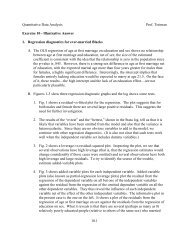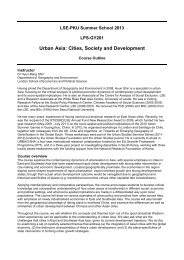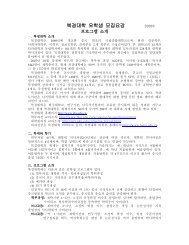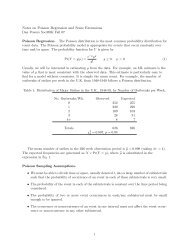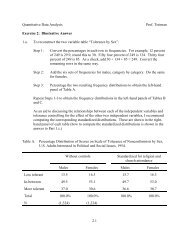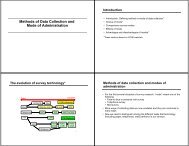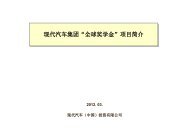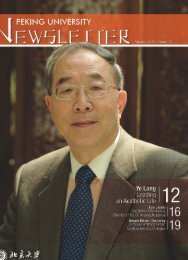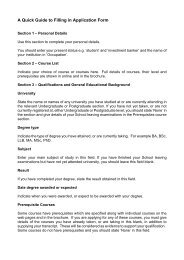LSE-PKU Summer School 2013 Brochure
LSE-PKU Summer School 2013 Brochure
LSE-PKU Summer School 2013 Brochure
You also want an ePaper? Increase the reach of your titles
YUMPU automatically turns print PDFs into web optimized ePapers that Google loves.
LPS-DV302 China in Developmental Perspective:<br />
The political economy of transformation<br />
PARTICIPANT<br />
PROFILE<br />
This course considers China’s political, economic, and social<br />
developments in a comparative and theoretical perspective.<br />
We examine China’s experiences in relation to experiences<br />
across the globe, engaging current controversies about the<br />
best approaches to international development. Students<br />
will gain a deeper political economy understanding of<br />
how and why China has developed; China’s capacities<br />
and possible pathways for approaching future challenges;<br />
and whether and how China may be a model for other<br />
developing countries.<br />
The course opens with consideration of the causes<br />
and obstacles for development around the world, and<br />
then relates China’s experiences to debates within<br />
international development. We explore the huge shifts<br />
in global economic performance and global political<br />
structures over time.We focus on how modern China<br />
has achieved exceptional reductions in poverty and broader<br />
development, examining both its uneven experiences<br />
pre-1978 and its exceptional economic growth story<br />
post-1978. At the same time, we consider the challenges<br />
it has and will continue to face. These experiences are<br />
related to competing theories of political, economic and<br />
social development.<br />
Throughout, we give in-depth attention to China as<br />
we explore comparative questions: Are some countries<br />
doomed to remain poor because of their climates or<br />
physical geography, or indeed their locations What<br />
forms of politics or ‘governance’ are most supportive<br />
of sustained economic growth and other development<br />
goals What drives authoritarian stability, governance<br />
reforms, and/or democratization, and what determines<br />
whether these are successful Is economic growth best<br />
promoted by market and trade development, economic<br />
independence, structural transformations and/or statedirected<br />
approaches Theory and evidence drawn from<br />
other countries, such as India, add additional perspective<br />
on China’s experiences.<br />
We conclude by evaluating whether and how China<br />
might successfully address key future challenges, such<br />
as heightened inequalities, diversity-related tensions,<br />
environmental protection, promotion of entrepreneurship<br />
and innovation, and a rising global impact.<br />
About the instructor<br />
Dr Mayling Birney is a Lecturer<br />
in the <strong>LSE</strong> Department of<br />
International Development, and<br />
a comparative political economist<br />
with special expertise in China. She<br />
is currently finishing a book about<br />
China’s distinctive form of authoritarianism and its<br />
consequences for stability, justice, and reform. Prior<br />
to arriving at <strong>LSE</strong> Dr Birney was a fellow and lecturer<br />
at Princeton University, and a fellow at the Brookings<br />
Institution. She also has professional experience in<br />
democratic politics, including as a Legislative Aide in<br />
the United States Senate. She holds a PhD in political<br />
science from Yale University, an MSc in economics<br />
from <strong>LSE</strong>, and a BA from Harvard University.<br />
Who are you<br />
My name is Camille Jetzer,<br />
I’m a French-British citizen<br />
living in Geneva. I am currently studying for a<br />
degree in Chinese at the University of Oxford.<br />
What did you study on the <strong>LSE</strong>-<strong>PKU</strong><br />
<strong>Summer</strong> <strong>School</strong><br />
I chose the law course “A Rule of Law” taught by<br />
professors from <strong>PKU</strong> who are experts in their field. I<br />
had been studying Chinese language, philosophy and<br />
history and was intrigued to discover how a western<br />
idea like the rule of law could apply in China. I also<br />
wanted to find out how commercial law works in China<br />
as this is important to any upcoming company.<br />
I was very pleased with the course. We covered a lot<br />
of material, but in depth. I remember the enthusiasm of<br />
our professors and teachers – they kept the class lively,<br />
gave us insight into their personal legal experience in<br />
China and paid special attention in answering all our<br />
questions. This enabled me to approach the course<br />
material from a different perspective.<br />
The course broadened my knowledge of China<br />
and made me examine recent socio-political<br />
developments and China’s international role in a new<br />
light. Having had a glimpse of law in China has led me<br />
to consider a possible new area of research or postgraduate<br />
study – now I am thinking I may apply for a<br />
post-graduate course in International Law.<br />
How was your experience of China<br />
Before the <strong>Summer</strong> <strong>School</strong> I had spent a year at<br />
Peking University as part of my degree. Having been<br />
living and working in Beijing for a year before the<br />
beginning of the course, it was a refreshing cultural<br />
shock to be back in a very multicultural environment.<br />
I made some very good friends on the course.



